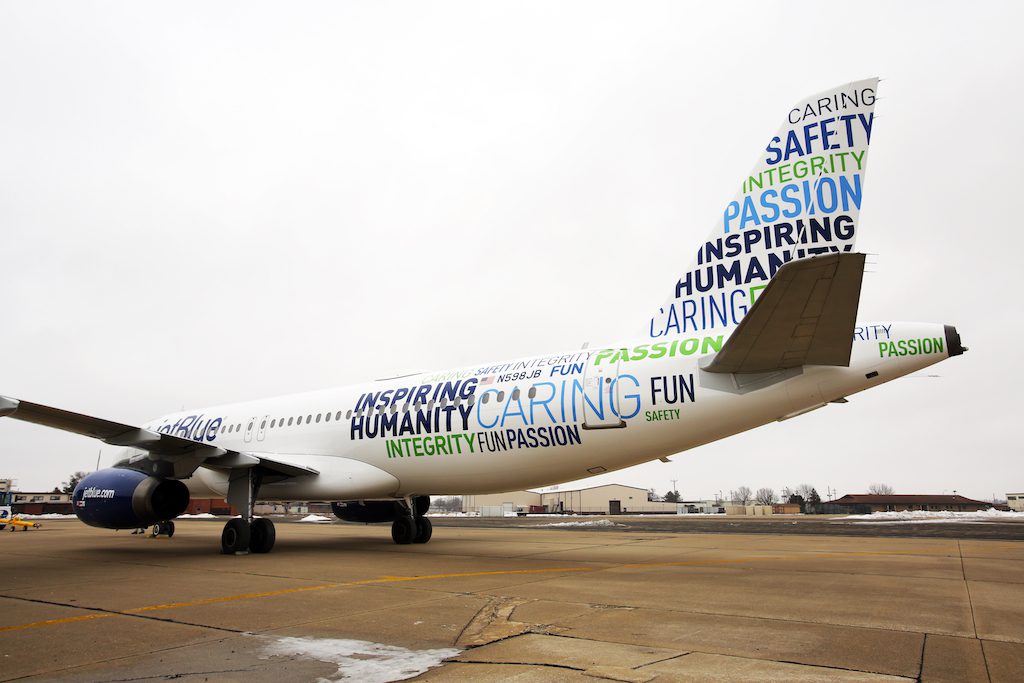JetBlue Girds for Airline Hub War in Boston

Skift Take
JetBlue Airways Chief Financial Officer Steve Priest on Wednesday chided aviation pundits who are asking if the nation's sixth-largest airline can maintain its dominant position in Boston as two larger carriers — American Airlines and Delta Air Lines — boost their presence at the airport.
He said JetBlue would be fine. "Commentators talk about Boston, they talk about Fort Lauderdale," he added during the Barclays Industrials Select Conference in Miami. "We are 20 years old now. We are very used to competitive incursions."
It's true JetBlue so far has withstood competition in Fort Lauderdale amid a challenge from Spirit Airlines. But what is coming to Boston may be unlike anything the airline has faced. In the past six months, Delta and American have signaled they will expand significantly in Boston, which accounts for about 30 percent of JetBlue's capacity, according to airline analyst Joseph DeNardi of Stifel.
Delta moved first, saying last summer it planned to build a hub in Boston, with executives suspecting they could win share from JetBlue in a key U.S. business market. JetBlue may not have welcomed this news, but it made sense. Boston is a lucrative, growing market, and Delta was making a rational decision to expand against a weaker competitor.
In recent weeks, however, the situation has become juicier. American, which had shrunk in Boston since it merged with US Airways, decided it wanted back in, adding new routes to non-hub cities, including Austin, Texas, and Indianapolis.
American is spinning the new flights as a response to demand, and while that might be true, the airline in recent weeks has been engaging in spirited competition with Delta, adding new routes from Delta's focus cities. It's a strategic change for American, which for the past five years almost exclusively has grown only in its biggest hubs.
This yen for adding non-core routes comes roughly four months after Delta poached America's largest partner in Latin America, Latam Airlines. American executives say otherwise, but some new routes from Boston could be designed as much to thwart Delta's ambitions as to make money.
This may put JetBlue in an uncomfortable position. American and Delta are global mega-carriers, capable of losing money short-term to achieve long-term strategic objectives. By comparison, JetBlue is tiny, and it has made clear to Wall Street it wants to boost margins now, not in five years.
In a report, analyst Jamie Baker of JP Morgan noted competition could hurt JetBlue's near-term fortunes. "JetBlue is growing head-to-head with Delta in the Boston market, and any near-term oversupply could result in unit revenue headwinds," he said.
JetBlue's Argument
Speaking to investors on Wednesday, Priest said JetBlue is betting it can escape Delta's wrath — and the Delta-American skirmish — by focusing on flying Boston travelers everywhere they want to go, nonstop.
Unlike the bigger airlines, JetBlue is predominantly a point-to-point carrier, with few customers making connections.
"Eighty-five percent of our business is point-to-point," Priest said. "The high-value geography that we have really lends itself to point-to-point business. Think about Boston from a geographical standpoint. It doesn't really lend itself to a hub-and-spoke city."
JetBlue is also counting on its brand equity, built up over two decades. JetBlue moved into Boston as its competitors, who had been larger there, retrenched to bigger hubs after Sept. 11. With limited competitive response, JetBlue built up a franchise as Boston's key business airline.
"With that relevance comes stickiness," Priest said. "We are very well-loved brand in Boston. When you get that, you can drive the ancillary benefits, like our loyalty program and everything that goes with it."
Alaska Airlines has been able to withstand similar competition from Delta in Seattle because its brand it so revered in the Pacific Northwest. It's not clear whether corporate customers will stick with JetBlue in the same way.
Transatlantic Expansion
By next year, JetBlue plans to plug one major hole in its Boston network, when it begins flights to London. It should also fly elsewhere in Europe next year, though it has not divulged markets.
Priest on Wednesday argued that London, along with further transatlantic expansion, is vital to making the airline relevant in Boston because corporate customers demand it.
"In Boston, we fly 40 of the top 50 routes," he said. "Of the remaining 10, five of them are in Europe. By far the biggest is London. Adding London to the network gives us a greater level of stickiness with corporate clients that enjoy flying JetBlue."
The problem is that most of its competitors fly to London. Delta already serves Heathrow and will start Gatwick this spring. Meanwhile, American relaunches Heathrow service next month.
But Priest said the airline, which is expected to introduce a new business class seat for transatlantic, will make it work.
"We welcome the competition," he said.




